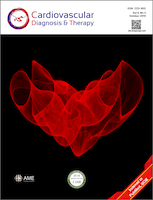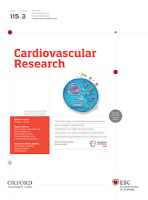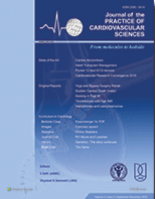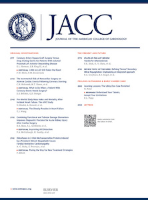
Cardiovascular Therapeutics
Scope & Guideline
Connecting Knowledge and Practice in Cardiology
Introduction
Aims and Scopes
- Cardiovascular Risk Assessment and Management:
The journal publishes studies focusing on the assessment of cardiovascular risk factors, including novel biomarkers and risk prediction models, to enhance the management and prevention of cardiovascular diseases. - Therapeutic Interventions and Clinical Trials:
A significant emphasis is placed on clinical trials evaluating the efficacy and safety of new therapeutic interventions, including pharmacological treatments, surgical procedures, and lifestyle modifications. - Pathophysiology and Mechanistic Insights:
Research articles delve into the underlying mechanisms of cardiovascular diseases, exploring cellular and molecular pathways that contribute to conditions such as myocardial infarction, heart failure, and atherosclerosis. - Rehabilitation and Exercise Therapy:
The journal highlights studies that assess the role of rehabilitation strategies, including exercise therapy and lifestyle interventions, in improving outcomes for patients with cardiovascular conditions. - Emerging Therapies and Natural Products:
There is a growing interest in the exploration of natural products and alternative therapies for cardiovascular diseases, with studies investigating their potential therapeutic roles and mechanisms of action. - Public Health and Epidemiological Studies:
Cardiovascular Therapeutics also prioritizes research addressing public health aspects, epidemiological trends, and the socioeconomic impact of cardiovascular diseases.
Trending and Emerging
- Biomarkers for Cardiovascular Diseases:
An increasing number of studies focus on identifying and validating novel biomarkers for cardiovascular diseases, particularly in heart failure and atherosclerosis, which can enhance early diagnosis and treatment. - Impact of COVID-19 on Cardiovascular Health:
Research examining the implications of COVID-19 on cardiovascular health, including the effects of viral infections on existing cardiovascular conditions, has surged, showcasing the pandemic's influence on cardiovascular research. - Integrative and Holistic Approaches to Treatment:
Emerging interest in integrative therapies, such as meditation, yoga, and lifestyle modifications, reflects a trend towards holistic approaches to cardiovascular health, emphasizing the importance of mental and physical well-being. - Advanced Imaging Techniques and Diagnostics:
There is a notable trend towards the utilization of advanced imaging techniques for better diagnosis and management of cardiovascular diseases, facilitating more precise interventions. - Artificial Intelligence and Machine Learning in Cardiovascular Research:
The application of AI and machine learning methods in cardiovascular research is rapidly growing, particularly in risk prediction models and personalized treatment strategies, marking a significant technological advancement in the field.
Declining or Waning
- Traditional Risk Factor Studies:
Research focusing solely on traditional cardiovascular risk factors, such as hypertension and hyperlipidemia, has decreased as newer methodologies and biomarkers gain traction in risk assessment. - Pharmacogenomics in Cardiovascular Therapy:
There has been a waning interest in studies solely dedicated to pharmacogenomic profiling for cardiovascular drug responses, possibly due to advancements in personalized medicine that integrate broader genetic and environmental factors. - Basic Science Studies without Clinical Relevance:
The journal has seen fewer submissions of basic science studies that do not translate into clinical applications, indicating a preference for research with direct implications for patient care.
Similar Journals

HEART AND VESSELS
Elevating Standards in Cardiovascular Research and PracticeHEART AND VESSELS is a prominent peer-reviewed journal published by SPRINGER, dedicated to advancing the fields of cardiology and cardiovascular medicine. With its ISSN 0910-8327 and E-ISSN 1615-2573, this esteemed journal encompasses a broad range of topics pertinent to heart health, vascular function, and associated therapies, making it an essential resource for researchers, clinicians, and healthcare professionals alike. Based in Japan and operating since 1985, HEART AND VESSELS has consistently maintained a Q2 ranking in the 2023 category quartiles, highlighting its relevance and impact in the cardio domain. Although it does not offer open access, the journal ensures high-quality publications that contribute significantly to the academic and clinical understanding of cardiovascular health. With over three decades of continuous scholarly contribution, HEART AND VESSELS serves as a vital platform for disseminating cutting-edge research and fostering innovative practices in the management of cardiovascular diseases.

Arquivos Brasileiros de Cardiologia
Fostering collaboration and innovation in cardiovascular health.Arquivos Brasileiros de Cardiologia is a leading open-access journal dedicated to advancing the field of cardiology and cardiovascular medicine. Established in 1950 and published by the ARQUIVOS BRASILEIROS CARDIOLOGIA, this Brazilian journal plays a crucial role in disseminating high-quality research that addresses both emerging and established topics in cardiovascular science. With an impressive history and a commitment to open access since 1997, it provides researchers, healthcare professionals, and students with free and readily available content that significantly contributes to the understanding and management of cardiovascular diseases. The journal is indexed in Scopus and holds a Q3 ranking in the category of Cardiology and Cardiovascular Medicine, demonstrating its relevance and participation within the global research community. Researchers can submit their work and access a wealth of information that spans a variety of subfields, reflecting the journal’s dedication to fostering innovation and collaboration within cardiology. With a mailing address at Avenida Marechal Câmara, 160-330 Centro, Rio de Janeiro, RJ 20,020-907, Brazil, the journal continues to serve as a vital platform for scholarly communication and knowledge exchange in the cardiovascular realm.

Cardiovascular Diagnosis and Therapy
Empowering Practitioners with Essential Cardiovascular KnowledgeCardiovascular Diagnosis and Therapy, an esteemed journal in the field of Cardiology and Cardiovascular Medicine, is published by AME PUBLISHING COMPANY, based in Hong Kong, China. With an ISSN of 2223-3652 and an E-ISSN of 2223-3660, this open-access journal aims to present cutting-edge research that significantly advances diagnostic and therapeutic practices in cardiovascular health. Recognized for its impact, it holds a 2023 category quartile ranking of Q2 and is positioned at rank #124 out of 387 in Scopus, reflecting its noteworthy contribution to medical literature with a percentile of 68th. The journal welcomes contributions that span various aspects of cardiovascular research, including clinical trials, epidemiological studies, and innovative therapeutic approaches, making it a vital resource for researchers, practitioners, and students alike, committed to improving cardiovascular care.

American Journal of Preventive Cardiology
Elevating Knowledge in Cardiovascular Prevention.American Journal of Preventive Cardiology, published by ELSEVIER, is a premier Open Access journal that has been making significant strides in the field of cardiology since its inception in 2020. With an impressive impact factor and recognized as a Q1 journal in the Cardiology and Cardiovascular Medicine category as of 2023, it ranks 77th out of 387 in the Scopus database, placing it in the 80th percentile of its field. The journal aims to promote the latest research and practices in preventive cardiology, addressing the global burden of cardiovascular diseases through a combination of innovative findings and practical applications. With the advantage of Open Access, all published articles are readily available to researchers, professionals, and students worldwide, fostering a broad dissemination of knowledge and encouraging collaboration across disciplines. Based in Amsterdam, Netherlands, the journal is committed to advancing the science and prevention of heart disease, making it an essential resource for those dedicated to improving cardiovascular health.

JOURNAL OF CARDIOVASCULAR PHARMACOLOGY AND THERAPEUTICS
Enhancing knowledge for a healthier heart.The JOURNAL OF CARDIOVASCULAR PHARMACOLOGY AND THERAPEUTICS, published by SAGE PUBLICATIONS INC, is a premier resource in the fields of cardiology and pharmacology, with an impressive impact factor reflective of its significant contributions to the scientific community. Established in 1996 and continuing through 2024, this journal is indexed in Scopus, achieving notable rankings, including Q2 in both Cardiology and Cardiovascular Medicine and Pharmacology. By fostering a multidisciplinary approach, it aims to improve pharmaceutical therapies and patient outcomes in cardiovascular health. Although not an open-access journal, it provides various subscription options to grant access to its cutting-edge research and reviews. As a vital platform for meaningful discourse and innovation in cardiovascular pharmacology, the journal attracts a diverse readership of researchers, professionals, and students, enhancing knowledge and advancing the field.

Journal of Atherosclerosis and Thrombosis
Innovating cardiovascular medicine through impactful research.Journal of Atherosclerosis and Thrombosis is a leading academic publication dedicated to advancing research in the fields of cardiovascular medicine, biochemistry, and internal medicine. Published by the Japan Atherosclerosis Society, this esteemed journal operates from its headquarters in Tokyo, Japan, and has been a vital resource in its area since its inception in 1994. With its robust impact in Cardiology and Cardiovascular Medicine, ranking in the top quartile (Q1) as of 2023, and a commendable standing in Internal Medicine and Biochemistry, the journal fosters an environment of innovation and discovery, showcasing significant studies and advancements that shape clinical practices and therapeutic approaches. Though not an open-access publication, it offers a wealth of insights to researchers, professionals, and students seeking to deepen their understanding of atherosclerosis and thrombosis. By continually featuring high-quality articles, the Journal of Atherosclerosis and Thrombosis plays an essential role in bridging the gap between research and practice, facilitating critical conversations that influence the future of cardiovascular health.

CARDIOVASCULAR RESEARCH
Transforming insights into clinical practice.CARDIOVASCULAR RESEARCH, published by Oxford University Press, is a premier academic journal dedicated to the evolving field of cardiology and cardiovascular medicine. With a remarkable impact factor reflecting its significant contribution to the scientific community, this journal maintains a Q1 ranking in both Cardiology and Physiology categories, demonstrating its commitment to publishing high-quality research that influences clinical practices and healthcare outcomes. Established in 1967, the journal has consistently provided a platform for innovative studies and reviews, aiming to advance our understanding of cardiovascular physiology and pathology. Researchers, professionals, and students will find published articles crucial for their work, as the journal covers a broad spectrum of topics including molecular biology, genetics, and clinical studies. While currently not offering open access options, CARDIOVASCULAR RESEARCH remains accessible through institutional and individual subscriptions, ensuring that the latest findings are available to those in the cardiovascular science community.

Journal of the Practice of Cardiovascular Sciences
Shaping the Future of Cardiovascular Health Through Open AccessJournal of the Practice of Cardiovascular Sciences, published by Wolters Kluwer Medknow Publications, is an esteemed Open Access journal dedicated to advancing knowledge in the field of cardiovascular health. With its ISSN 2395-5414 and E-ISSN 2454-2830, the journal serves as a vital platform for researchers, healthcare professionals, and students to disseminate and access high-quality studies, innovations, and practical applications related to cardiovascular sciences. Established in 2015 as an Open Access journal, it promotes widespread sharing of insights to enhance cardiovascular practices and address contemporary challenges in the field. As part of a reputable publishing group, the journal is poised for growth and impact, contributing significantly to the ongoing dialogue in cardiovascular research and clinical practice.

JOURNAL OF THE AMERICAN COLLEGE OF CARDIOLOGY
Empowering Clinicians with Cutting-Edge Cardiac ResearchJOURNAL OF THE AMERICAN COLLEGE OF CARDIOLOGY, the esteemed publication of Elsevier Science Inc, stands as a premier platform for advancing knowledge in the field of cardiology and cardiovascular medicine. With an impressive impact factor reflecting its prominence—ranked Q1 in its category for 2023 and occupying the 4th position out of 387 in the Scopus listings, firmly placing it in the 99th percentile—this journal is essential for researchers, clinicians, and students alike. Since its inception in 1983, it has continuously provided a vital space for high-quality research and innovative clinical practices, driving forward our understanding of cardiovascular health. While access options are not open, the value of the cutting-edge articles published here cannot be overstated, as they foster collaboration and inform better patient care across the globe. As part of its ongoing commitment to excellence, the journal solicits submissions of original research, reviews, and clinical studies that contribute meaningfully to the field and engage its diverse readership.

Cardiology Research
Elevating heart health through rigorous scientific inquiry.Cardiology Research is a prominent open-access journal dedicated to advancing the field of cardiology and cardiovascular medicine, published by ELMER PRESS INC. Renowned for its rigorous peer-review process, the journal provides a platform for cutting-edge research and innovative clinical practices in cardiology. With an ISSN of 1923-2829 and an E-ISSN of 1923-2837, it has established an impactful presence in the academic community, achieving a 2023 Scopus quartile ranking of Q3 in its category, positioning it in the 41st percentile. The journal's scope encompasses various aspects of cardiology research, including but not limited to epidemiology, diagnostics, therapeutics, and cardiovascular interventions. Although it operates without open access in certain contexts, it provides flexible access options for readers, ensuring that its valuable insights are widely disseminated. Cardiology Research is an essential resource for researchers, healthcare professionals, and students who aspire to stay at the forefront of cardiovascular science, contributing significantly to the global discourse on heart health.